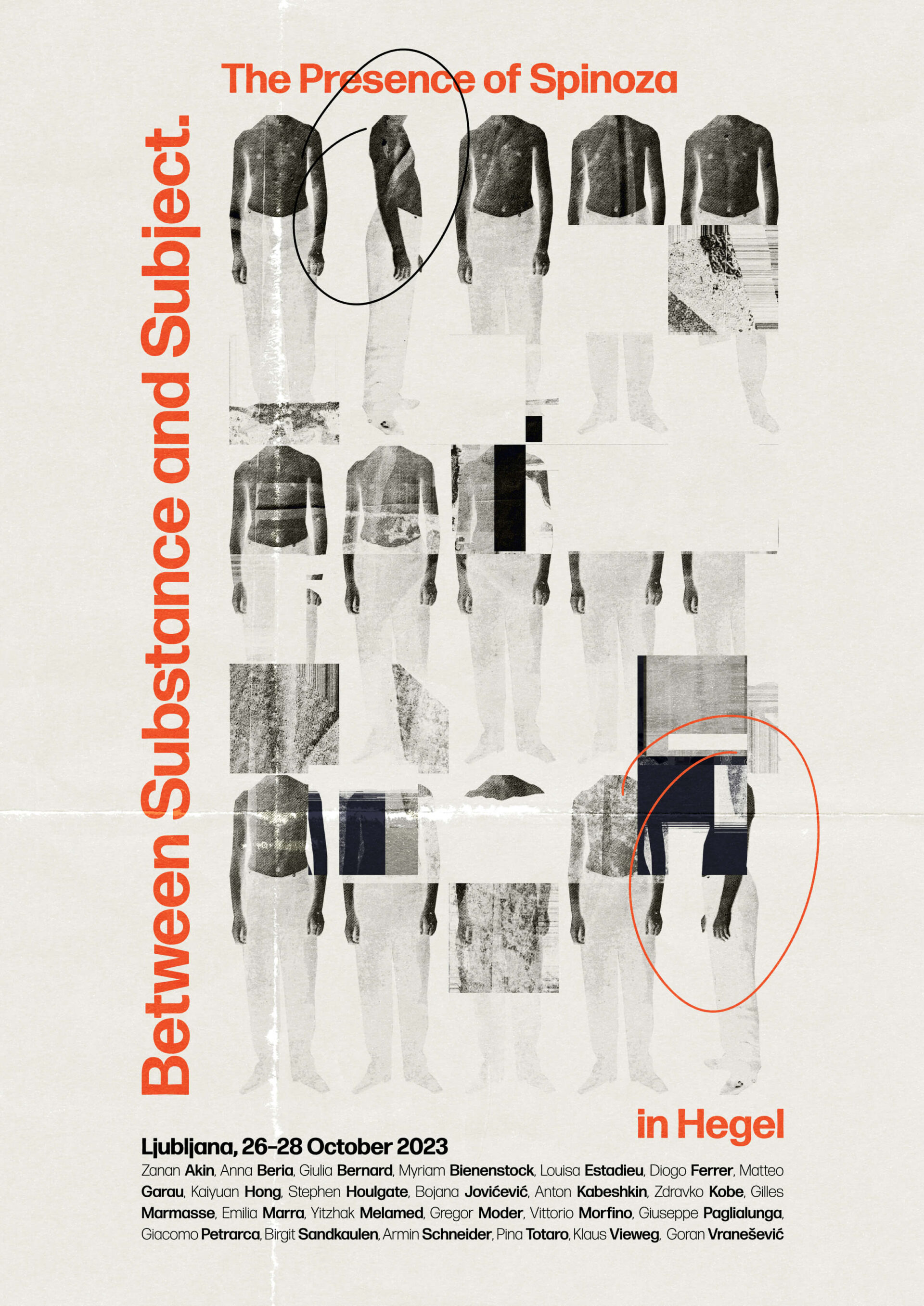International Conference: “Between Substance and Subject. The Presence of Spinoza in Hegel” (Ljubljana, 26-28 October 2023)
Academy of Theatre, Radio, Film and Television (AGRFT)
Aškerčeva cesta 5, Ljubljana
BEGIN:VCALENDAR … BEGIN:VEVENT TRANSP:TRANSPARENT DTEND;VALUE=DATE:20231029 UID:24506_cpkp_event DESCRIPTION: // University of Ljubljana // Academy of Theatre, Radio, Film and Television (AGRFT) // Aškerčeva cesta 5, Ljubljana STATUS:CONFIRMED SEQUENCE:1 X-APPLE-TRAVEL-ADVISORY-BEHAVIOR:AUTOMATIC SUMMARY:International Conference: “Between Substance and Subject. The Presence of Spinoza in Hegel” (Ljubljana, 26-28 October 2023) DTSTART;VALUE=DATE:20231026 BEGIN:VALARM X-WR-ALARMUID:24506_cpkp_event_alarm UID:24506_cpkp_event_alarm TRIGGER:-PT15H X-APPLE-DEFAULT-ALARM:TRUE ATTACH;VALUE=URI:Chord ACTION:AUDIO END:VALARM END:VEVENT END:VCALENDAR
We are glad to announce the International Conference Between Substance and Subject. The Presence of Spinoza in Hegel, which will take place on October 26th-28th, 2023, at the University of Ljubljana (Academy of Theater, Radio, Film and Television AGRFT, Aškerčeva cesta 5).
The event is organized by Giovanna Luciano (Padua), Martin Hergouth (Ljubljana), Luca Illetterati (Padua), Bojana Jovićević (Ljubljana), Zdravko Kobe (Ljubljana), Goran Vranešević (Ljubljana), together with the Internationales Netzwerk Hegels Relevanz.
The complete program of the event is available at this link.
Below you can find the presentation of the conference and the list of speakers.
***
In the Lectures on the History of Philosophy Hegel notes that Spinoza confronts us with the fundamental alternative: Either Spinozism or no philosophy. In the Science of Logic, he affirms that the only possible refutation of Spinozism consists in first acknowledging its standpoint as essential and necessary and then raising it to a higher level out of its own resources. In philosophy one is accordingly bound to begin as a Spinozist, but it is of equal importance not to remain one. Even Hegel’s programmatic declaration in the Preface to the Phenomenology of Spirit that in his view the true must be comprehended not merely as substance but also as subject, may be read in a double reference to Spinoza: on the one hand, Hegel seems to put the task of philosophy in accepting Spinozist metaphysics and nonetheless in preserving the dimensions of freedom, beauty and life that is usually associated with subjectivity, which Spinozism is supposed to lack; according to the methodological reading, on the other hand, Hegel may be said to call for developing a new conceptual regime that would supersede the mechanistic logic of understanding, exemplified by Spinoza’s mos geometricus, into a truly Hegelian logic of reason. Hegel’s entire philosophical system can thus be understood as a prolonged argument with Spinoza that raised to prominence with the Pantheism Controversy. What is more, not only there was a time when Hegel himself defended metaphysics of one substance, it may be argued that he eventually distanced himself from Spinozist metaphysics under the influence of Spinoza’s own political philosophy. The question is, of course, to what extent Hegel’s understanding of Spinoza was correct (for instance, omnis determinatio negatio, the concept of infinity) and to what extent he read it through Jacobi or Schelling. But it is obvious that, in most various forms, Spinoza is present throughout his philosophy, be it as the ideal to match or the adversary to beat. The aim of the conference is to explore this multifaceted presence of Spinoza in Hegel.
The speakers are:
- Myriam Bienenstock (Université François-Rabelais)
- Giacomo Petrarca (Università Vita-Salute San Raffaele)
- Emilia Marra (University of Rijeka)
- Diogo Ferrer (Universidade de Coimbra)
- Bojana Jovićević (University of Ljubljana)
- Anton Kabeshkin (Universitat Potsdam)
- Stephen Houlgate (University of Warwick)
- Birgit Sandkaulen (Ruhr-Universität Bochum)
- Zanan Akin (Friedrich-Schiller-Universität Jena)
- Kaiyuan Hong (Tsinghua University)
- Giulia Bernard (Università degli Studi di Padova)
- Yitzhak Melamed (John Hopkins University)
- Armin Schneider (Humboldt-Universitat zu Berlin)
- Pina Totaro (Università di Roma Sapienza)
- Anna Beria (Kingston University)
- Klaus Vieweg (Friedrich-Schiller-Universität Jena)
- Gilles Marmasse (Université de Poitiers)
- Louisa Estadieu (Albert-Ludwigs-Universität Freiburg)
- Giuseppe Paglialunga (Università degli Studi di Padova)
- Gregor Moder (University of Ljubljana)
- Zdravko Kobe (University of Ljubljana)
- Matteo Garau (Università di Torino)
- Goran Vranešević (University of Ljubljana)
- Vittorio Morfino (Università degli Studi di Milano-Bicocca)
For further information, please visit the website of the conference.


